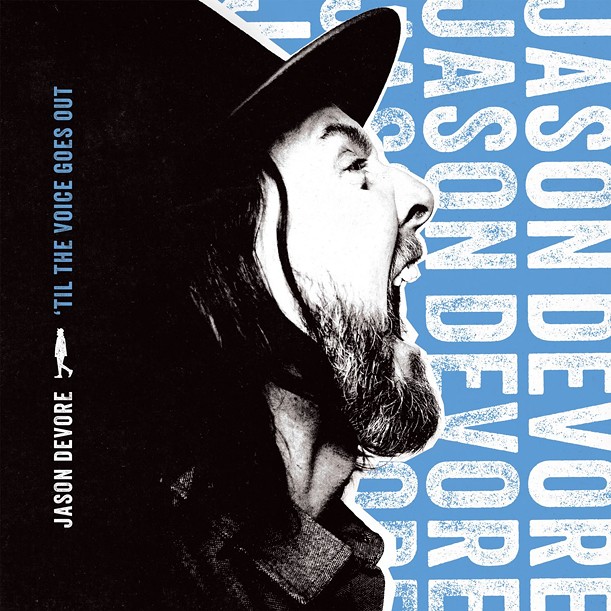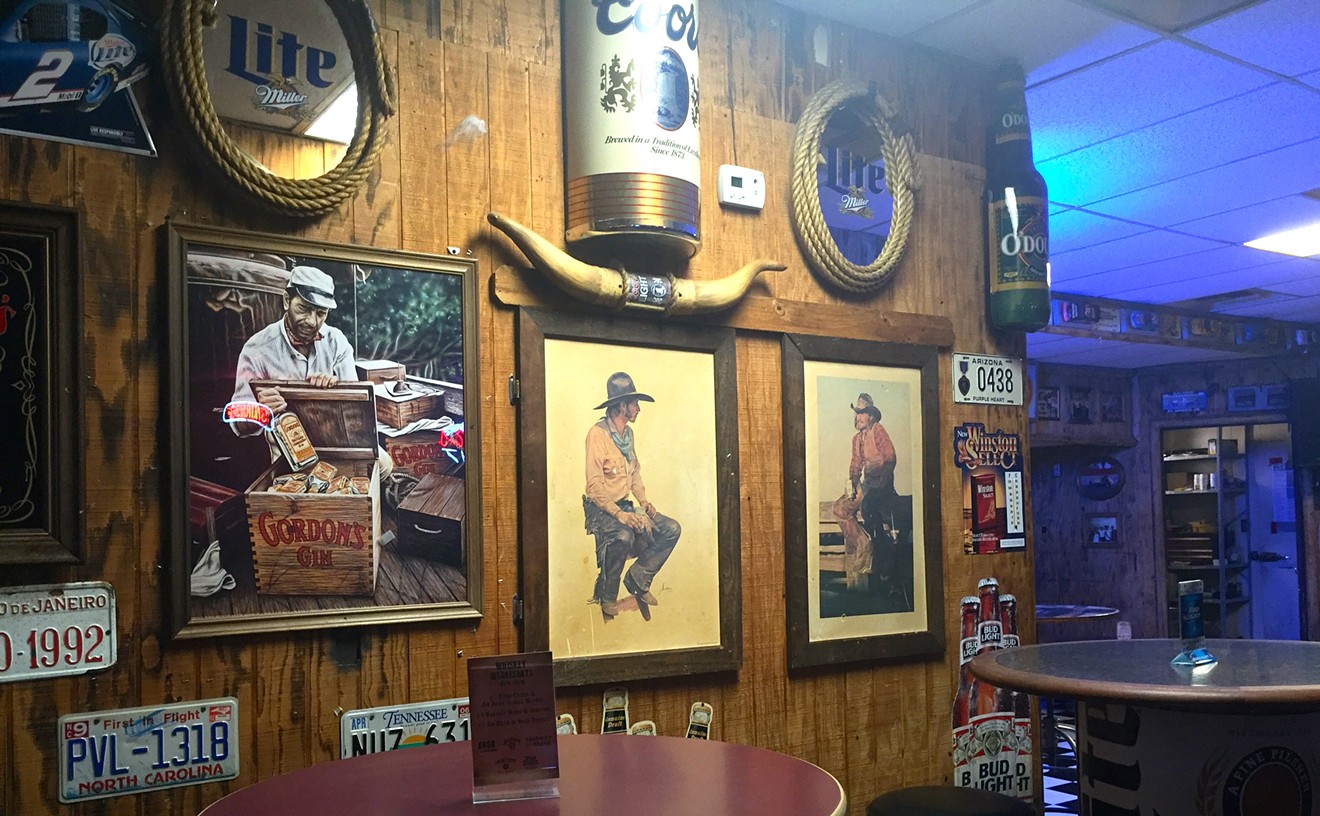Jason DeVore’s already got a busy 2024 thanks to the 30th anniversary celebration for Authority Zero. But then he went ahead and decided to release a new solo record to boot.
"I take this as seriously as Authority Zero," he says. "It's such a baby of a project, even though this is my 18th year as a solo artist, which is kind of crazy."
Still, it’s not that crazy to "double dip," as it were, with the release of June’s "'Til The Voice Goes Out." In recent years, DeVore’s made big personal changes, and he’s found himself with both considerable energy and motivation as well as a newfound creative drive.
"With the changes in my own life that I've made, and redirected my conscious efforts toward things, I'm focused to make sure all of the things are very well attended and very well done," DeVore says. He can "put every ounce of energy that I'm not doing something with the band into my solo stuff, ... which I just like to call my solo career rather than a side project."
And that classification matters: DeVore’s solo career is quite different from his Authority Zero output.
"I get 70- or 80-year-olds that come to my shows. They're not into Authority Zero," he says. "It keeps people guessing. You can have so many facets to your life and your person."
As such, the mission statement has always been to be his own thing.
"It was my intention to do this solo project free of the ties to the band name," DeVore says. "If we were playing out, I'd be at open mics around town. And I'd say, 'You can't use the band name. I just want you to put down Jason DeVore.' I really wanted to have people that listen to this music have no idea. Some will, I'm sure, but I want them to be there and enjoy the songs. It's been cool starting from the bottom and doing all that legwork again."
Part of that whole process is that DeVore proves to be much more earnest and open on records like "'Til The Voice Goes Out" — his baseline is tailored to different wants and needs.
"I'm extremely vulnerable on solo records, which is a huge thing," he says. His solo work is about "taking my voice to the extremes that I've done — it's almost the opposite with Authority, which is high intensity, but in a different direction of intensity. It's different emotions and different registers to push myself always and see what's the capability."
To some extent, DeVore recognizes that "people might view me differently as a frontman of the band because of it." However, he just has to do what's best for him at the moment.
"But part of me doesn't care anymore," he says. "I think it's a thing with growing up, and having done this and finding yourself and a peace in who you are without trying to impress anybody and just doing it for yourself. If people want to come along for the ride and they appreciate that, you're so grateful, but you're not forcing anybody to be with it for you."
That attitude likely stems from DeVore's more recent-ish sobriety. It's certainly had an effect with his work in leading Authority Zero, but it's a decision that's really influenced and shaped his solo stuff.
"There was a little bit of a moment when I had my first year of sobriety, I didn't tell anybody about it," DeVore says. "I didn't tell any of the world, didn't tell any of the fans of the band, didn't make it public because it's my own journey. A lot of times when you do that, they hold you under a microscope and make a judgment. They tell you, of course, why you're actually doing it for the wrong reasons. I was doing it for myself, but I also did it for them. To give fans the band they deserve, the frontman they deserve and the voice they believe in and deserve."
At the end of the day, however, DeVore just had to find a new definition of "partying" and celebrating.
"I want them to feel these songs for what they are and not try and spice them up and make them over-exciting," he says. "I guess it's got to be a big party environment, but rather in that experience of the honesty of them. It's all about touching and tapping into different emotional things that are within people."
He adds, "We let the other people do the drinking. And I can do that better for them now and let them have a better time. I was a little worried that people would be like, 'Well, that's the end of this. That's the sober guy; he's not going to have anything cool to say. He's not going to be fun.' Rather, it's the opposite. I want to get out there and live harder and have more fun with you now."
Not drinking has made DeVore a more engaged and even approachable performer.
"When you're newly sober, you're on a completely different high," he says. "You're clear-headed and you're not afraid of shit. You think you can take on the world. You feel like Superman. You've been in the dark for so long and blanketed that suddenly your eyes are open to life again."
But more than anything, it's made him decidedly more hungry and curious.
"I've been doing so much more again with the resurgence of the band, and that's very heavily embedded within me right now with my writing," he says. "I think it shows more on this solo record, as opposed to my last three that were very, very singer-songwriter-esque. There's orchestrations and there's trumpet parts. It's all just growth to me."
Along the way, DeVore's had some help. He first credits his label, Double Helix Records, which "made this such an exciting adventure with this new record." And, of course, there's the many collaborators across the record, including co-producer Bob Hoag as well as Tom Lord-Alge and Jason Livermore, who mixed and mastered the album, respectively.
"I've got a connection with great musicians who have been willing and excited to be a part of this record with me because before I would just record everything myself," DeVore says. "So many people stepped up to the plate that are local friends of mine and different touring bands in their free time. ... It made it so much more exciting in the studio and just for people to hear and be able to talk about them and their projects."
But ultimately, DeVore had to put in the work himself, sometimes amid touring with Authority Zero, to make these songs really happen.
"A lot of these songs were written pre-putting the bottle down, and there's a lot of pain in those songs," he says. "I remember specifically the time I wrote those songs. I was out in Europe for five weeks on tour. I was in a very, very dark place. Things were rough."
But after what he calls the "transition," DeVore relied on those feelings and experiences to really get in touch with himself and mine these deeper ideas and emotions.
"I had a catalog of notes from, like, two years before the pandemic," he says. "I had some stuff to talk about and I meant it when I said it. I kept it honest in remembering that time and place and those emotions to not veer off path. ... And so from that came my transition of things. You can hear the dynamics in the music of this record."
One of the album's standouts is "Go For It," which rings with a profound honesty amid an already deeply resonant record.
"It's another one I wrote in Europe," DeVore says. "I got up early in the morning and the sun was coming up. I wrote that song with the sunrise, sitting in the van with the door split open, the seatbelts right at my ankles. It starts out so honest. The idea in that song of rejoicing and celebrating life, but in the darkest times."
But you can't talk about the record without mentioning his cover of "Hallelujah," that of-covered seminal ballad by Leonard Cohen (though DeVore identifies with the much-lauded Jeff Buckley version).
"People are probably like, 'What the hell is this guy doing?'" DeVore says. "I heard it in 2000 on tour at the peak of the punk rock mentality. The voice and message and the intensity just felt so captivating. It made me want to try to do things with my voice. And that's how this whole journey began. I never had the confidence, the playing ability or any of that to cover that song. Because it's been done really well by a lot of people. I've been a fan of this record for a long time and it means so much given the healing power of this record."
Sure, there's a lot going on in this record in terms of emotions and end goals. But it generally boils down to one overarching idea.
"I always say life is experience," DeVore says. "Because good or bad, it's always a life experience. And you learn something from that. Or, you don't do that again."
It's about embracing life's unevenness, and trying to recognize what it really and truly means to be alive.
"You're lucky to feel this pain you're feeling, as sadistic as it might sound in some ways to some people," he says. "You have this moment to feel that emotional pain that gives you the opportunity to turn it around and change it and think different things about how you're going to handle it to not feel that way again."
It's an especially important lesson nowadays, DeVore notes. Because even if it means he's out on the road even longer, or he's balancing a band and a solo career, DeVore just wants to do the best version of what he's always done: use music as a tool to reach into folks' hearts and minds, sometimes for celebration but always to remind us that we're never truly alone.
"We've been through some shit universally as people," he says. "People are feeling that life is over as we know it. People are feeling the separation of everything within families and within their own thoughts. ... They don't know who to trust — their own governments, their own families, their own decision-making — because you've been fed so many different things by this point. It's about (smashing) those barriers and doing whatever you want to fucking do. I think people, even if they're hiding in the room listening (to the record), can find some appreciation in it."
[
{
"name": "Air - MediumRectangle - Inline Content - Mobile Display Size",
"component": "18478561",
"insertPoint": "2",
"requiredCountToDisplay": "2",
"watchElement": ".fdn-content-body",
"astAdList": [
{
"adType": "rectangle",
"displayTargets": "mobile"
}
]
},{
"name": "Editor Picks",
"component": "16759093",
"insertPoint": "4",
"requiredCountToDisplay": "1",
"watchElement": ".fdn-content-body",
"astAdList": [
{
"adType": "rectangle",
"displayTargets": "desktop|tablet"
},{
"adType": "rectangle",
"displayTargets": "desktop|tablet|mobile"
}
]
},{
"name": "Inline Links",
"component": "17980324",
"insertPoint": "8th",
"startingPoint": 8,
"requiredCountToDisplay": "7",
"maxInsertions": 25
},{
"name": "Air - MediumRectangle - Combo - Inline Content",
"component": "16759092",
"insertPoint": "8th",
"startingPoint": 8,
"requiredCountToDisplay": "7",
"maxInsertions": 25,
"watchElement": ".fdn-content-body",
"astAdList": [
{
"adType": "rectangle",
"displayTargets": "desktop|tablet"
},{
"adType": "rectangle",
"displayTargets": "desktop|tablet|mobile"
}
]
},{
"name": "Inline Links",
"component": "17980324",
"insertPoint": "8th",
"startingPoint": 12,
"requiredCountToDisplay": "11",
"maxInsertions": 24
},{
"name": "Air - Leaderboard Tower - Combo - Inline Content",
"component": "16759094",
"insertPoint": "8th",
"startingPoint": 12,
"requiredCountToDisplay": "11",
"maxInsertions": 24,
"watchElement": ".fdn-content-body",
"astAdList": [
{
"adType": "leaderboardInlineContent",
"displayTargets": "desktop|tablet"
},{
"adType": "tower",
"displayTargets": "mobile"
}
]
}
]












